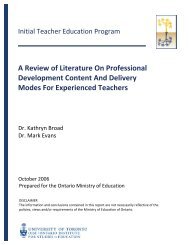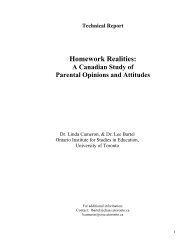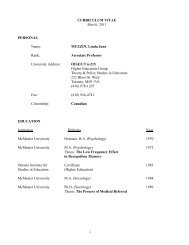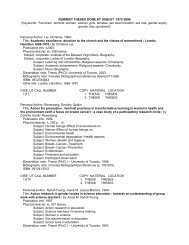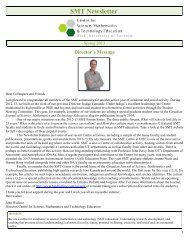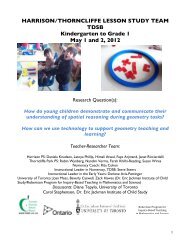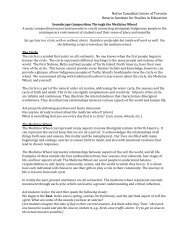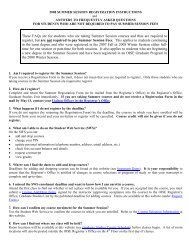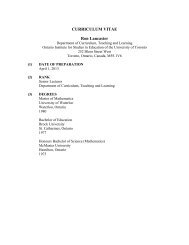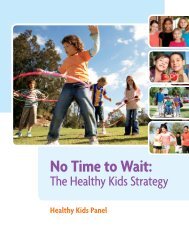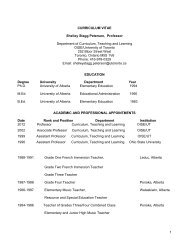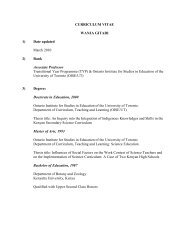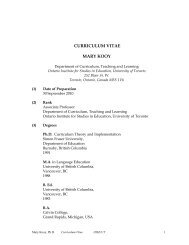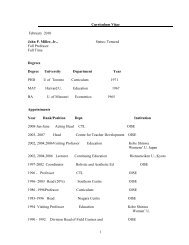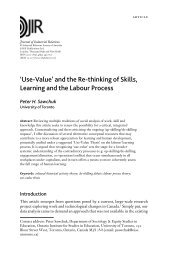The Ontario Curriculum, Grades 9-12 - Ministère de l'éducation ...
The Ontario Curriculum, Grades 9-12 - Ministère de l'éducation ...
The Ontario Curriculum, Grades 9-12 - Ministère de l'éducation ...
Create successful ePaper yourself
Turn your PDF publications into a flip-book with our unique Google optimized e-Paper software.
HOSPITALITY AND TOURISM<br />
Hospitality and Tourism, Gra<strong>de</strong> 11, College Preparation (TFJ3C)<br />
A. Hospitality and Tourism Fundamentals<br />
A1. <strong>The</strong> Tourism Industry<br />
A1.2 explain how various types of services, events, and activities from around the province<br />
(e.g., youth hostels, air transportation, ecotourism, weddings, gui<strong>de</strong>d tours) are<br />
associated with one or more sectors of the tourism industry<br />
A1.6 explain the effect of the weather and seasonal changes on the availability, pricing, and<br />
quality of products and services within the tourism industry<br />
A3. Culinary Knowledge<br />
A3.7 <strong>de</strong>scribe the effects of climate and season on the availability, quality, price, and<br />
nutritional value of food products and services<br />
C. Industry Practices, the Environment, and Society<br />
C1. Industry Practices and the Environment<br />
C1. <strong>de</strong>monstrate an un<strong>de</strong>rstanding of factors that affect the relationship between the tourism<br />
industry and the environment<br />
C1.1 explain the need for environmentally friendly waste management in the various sectors of<br />
the tourism industry (e.g., with regard to disposal of cooking oil and garbage, recycling<br />
of plastic and glass, composting of organic waste)<br />
C1.2 <strong>de</strong>fine environmental sustainability as it applies to the various sectors of the tourism<br />
industry (e.g., staying within the carrying capacity of environmentally sensitive areas;<br />
using energy-efficient buildings, equipment, and transportation; reusing and/or recycling<br />
waste products)<br />
C1.3 explain how the relationship between food producers and food consumers affects the<br />
environment (e.g., production of organic foods in response to consumer <strong>de</strong>mand results<br />
in less use of chemical fertilizers and pestici<strong>de</strong>s; the Slow Food movement supports local<br />
food production and the continuing use of traditional food products; culinary tourism<br />
increases consumer awareness of and helps to support traditional food producers in<br />
many parts of the world)<br />
C1.4 assess the ecological footprint of an event or activity<br />
C2. Industry Practices and Society<br />
C2.3 <strong>de</strong>scribe the social responsibility of companies and workers in the tourism industry (e.g.,<br />
with regard to equal employment opportunities, conservation and preservation of the<br />
environment, relations with local communities)<br />
Technological Education 199



